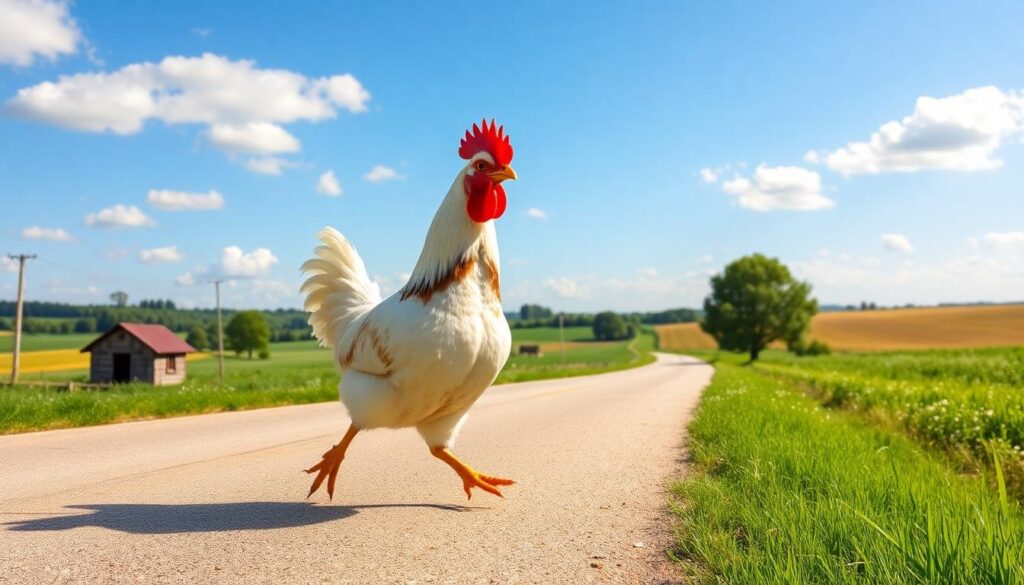Why did the chicken cross the road? This age-old riddle has sparked countless punchlines and has become one of the most recognizable joke formats in history. We’ve all heard the classic answer, “To get to the other side,” but the beauty of this simple setup lies in its endless potential for creative, witty, and sometimes groan-worthy responses.
In this collection, we’ll share our favorite chicken crossing jokes that’ll have you clucking with laughter. From clever wordplay to pop culture references, these jokes have evolved far beyond their humble origins. Whether you’re looking to lighten the mood at a family dinner or need some clean humor for your next presentation, these feathered friend jokes are sure to crack up your audience.
Why Did the Chicken Cross the Road? The Origin of the Classic Joke
The joke “Why did the chicken cross the road?” first appeared in print in The Knickerbocker, a New York magazine, in March 1847. Its publication marked the beginning of what would become one of the most recognizable jokes in the English language. The simple anti-humor format featuring the straightforward answer, “To get to the other side,” created a template that has been reused and reimagined countless times since.
Many humor scholars believe the joke’s enduring popularity stems from its subversion of expectations. When people hear the setup, they anticipate a clever punchline, but instead receive a literal, obvious answer. This anti-climactic resolution actually creates the humor, catching listeners off guard with its simplicity.
Throughout the 19th century, the chicken joke spread through American popular culture, appearing in newspapers, books, and vaudeville performances. By the early 20th century, it had become a staple of childhood humor and a recognized cultural reference point in the United States.
The joke’s format proved exceptionally versatile, allowing it to evolve with changing times. During the 1920s, variations began to emerge that incorporated contemporary references, with new punchlines reflecting the cultural zeitgeist of each era.
No single person can claim authorship of this classic joke, as it developed organically through oral tradition. Its anonymous creation contributes to its universal appeal, belonging to everyone while claimed by no one.
We’ve seen the joke translated into dozens of languages worldwide, maintaining its fundamental structure while adapting to different cultural contexts. This remarkable adaptability has helped it maintain relevance across generations and geographical boundaries.
Today, the chicken crossing joke serves as both a standalone quip and a foundation for more complex humor. Comedians and writers continue to create variations that reflect modern sensibilities, proving that this simple format still offers endless possibilities for creative expression.
10 Classic Chicken Cross the Road Jokes That Never Get Old
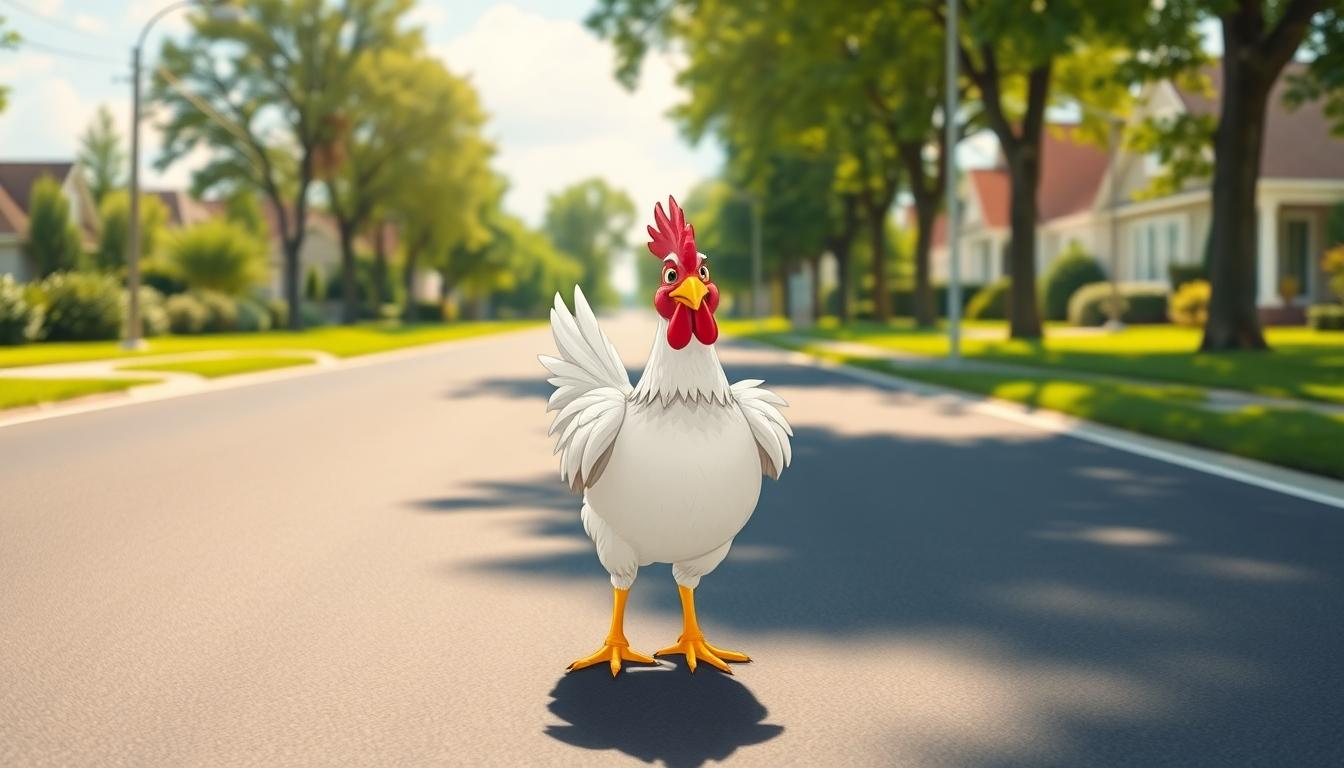
The Original Joke and Its Simple Humor
The classic chicken joke first appeared in print in The Knickerbocker magazine back in 1847, asking the now-famous question: “Why did the chicken cross the road?” Its brilliance lies in the anti-humor structure of the answer: “To get to the other side.” This straightforward response subverts our expectations of a clever punchline, creating humor through its deliberate simplicity. The joke gained popularity through performances by Christy’s Minstrels, a blackface troupe in the 1840s, where it was featured in comedic dialogues between characters Tambo and Bones.
Famous Philosophers’ Takes on the Chicken Joke
Creative variations of the chicken joke often parody philosophical and scientific perspectives with hilarious results. Galileo’s version states, “It put one foot in front of the other and took sufficient steps to traverse the distance,” perfectly capturing his scientific approach to movement. Quantum physicists offer their own twist with, “Because the observer collapsed its wavefunction,” cleverly referencing fundamental concepts in theoretical physics. Existentialists contribute a deeper perspective with, “To question the meaning of ‘road’ on a deeper level,” demonstrating how this simple joke can be adapted to mock various intellectual traditions.
Other classic variations include the possum-themed joke, “To prove to the possum it could be done,” and the Colonel Sanders escape joke, “To escape Colonel Sanders.” Some versions incorporate wordplay, like the 1890s pun from Potter’s American Monthly asking, “Why should not a chicken cross the road?” with the answer, “It would be a fowl proceeding,” playing on the words “fowl” and “foul.” The self-referential joke, “To spawn decades of meta-humor about poultry-based road-crossing,” and the historically aware, “To avoid being part of a 19th-century fowl proceeding pun,” demonstrate how this simple joke continues to evolve while maintaining its fundamental charm.
7 Celebrity-Inspired Chicken Cross the Road Jokes
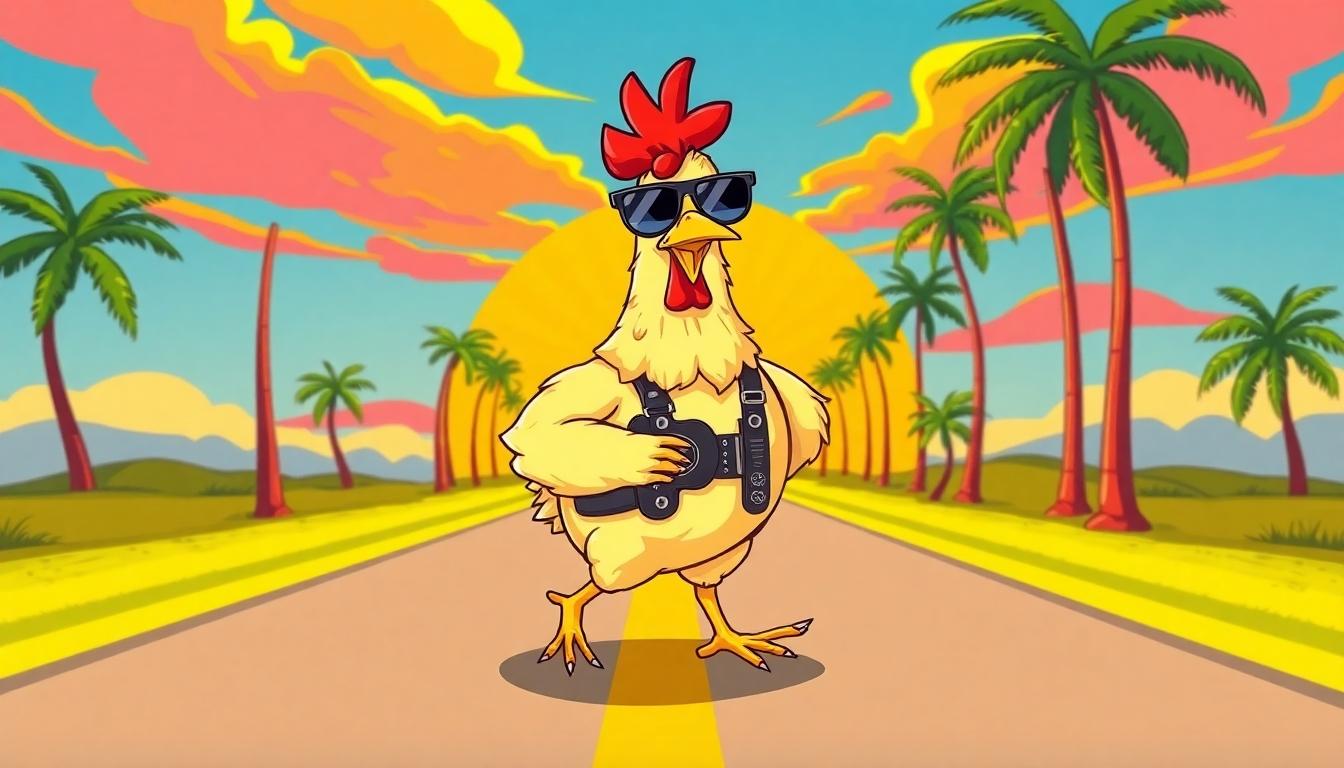
Celebrities have put their own spin on the classic chicken joke, adding their personal flair and humor style. These adaptations reflect their public personas and often incorporate their famous catchphrases or notable characteristics.
- Albert Einstein: “Did the chicken really cross the road, or did the road move beneath the chicken?”
- Bill Clinton: “I did not cross the road with THAT chicken.”
- Sarah Palin: “The chicken crossed the road because, gosh-darn it, he’s a maverick!”
- Barack Obama: “The chicken crossed the road because it was time for change!”
- Celebrity Chick: “What do you call a chicken that crossed the road and became famous? A celebrity chick!”
- Ticket Trouble: “Why did the chicken get a ticket? For crossing against the light!”
- Fowl Crossing: “What do you get when a chicken crosses the road? A fowl crossing!”
Hollywood Stars’ Versions
Hollywood stars bring dramatic flair to chicken jokes, often incorporating elements from their movies or public personas. Action stars typically adapt the joke with high-stakes scenarios, featuring chickens on daring missions across dangerous roads. Comedy actors frequently turn the simple crossing into elaborate setups with unexpected punchlines that showcase their signature humor. Directors might frame the chicken’s journey as an epic tale of courage and determination, complete with dramatic pauses and intense background music. Some stars even incorporate their famous catchphrases, transforming the humble chicken joke into something instantly recognizable as their own unique take.
Musicians and Their Chicken Jokes
Musicians create rhythm-filled variations that often include clever wordplay related to their create. The “hen-dance” joke asks, “What’s a chicken’s favorite type of music?” with the punchline “Hen-dance!” showcasing musical terminology in a playful way. Drummers particularly enjoy the classic “Why did the chicken join a band? Because it had the drumsticks!” which connects perfectly to their instrument. Rock stars might reference “crossing the road” to get to the “other side” of fame, while country musicians often add rural elements to their chicken tales. These musical adaptations demonstrate how versatile the chicken joke format can be, allowing artists from all genres to create versions that resonate with their fans while maintaining the familiar structure that makes these jokes instantly recognizable.
8 Profession-Based Chicken Cross the Road Jokes
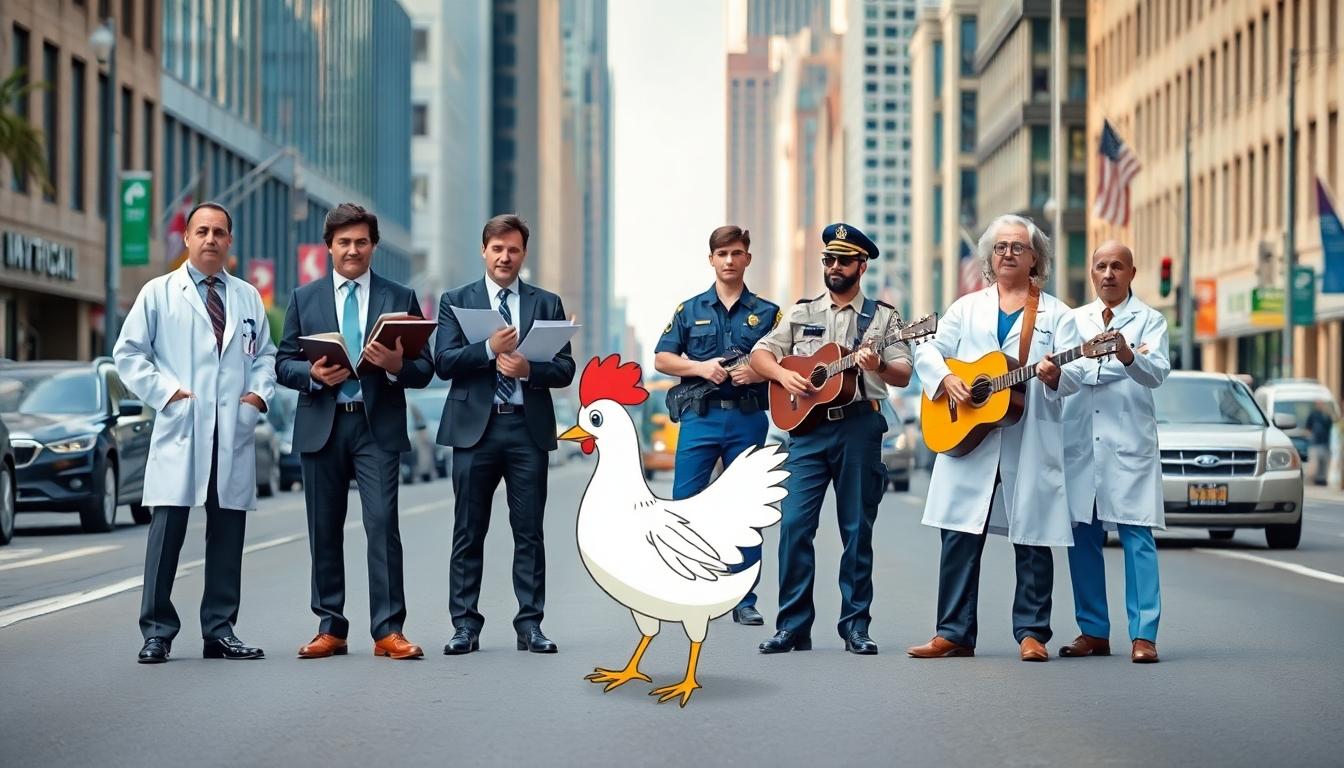
Ever wondered how different professionals would tell the classic chicken joke? These profession-based variations showcase how occupational perspectives can add a hilarious twist to the timeless riddle.
What Doctors, Lawyers, and Teachers Would Say
Doctors approach the chicken riddle with medical expertise: “Why did the chicken cross the road? To get a second opinion!” This perfectly captures healthcare professionals’ cautious nature.
Lawyers immediately spot the potential legal case: “Why did the chicken cross the road? To sue the farmer for negligence!” This variation reflects the litigation-minded perspective many attorneys bring to everyday situations.
Teachers turn everything into a learning opportunity: “Why did the chicken cross the road? To get to the lesson on the other side!” Their educational spin demonstrates how instructors can find teaching moments anywhere.
Engineers view the chicken’s journey through efficiency metrics: “Why did the chicken cross the road? To optimize traffic flow by taking the shortest path!” This technical approach showcases their problem-solving mindset.
Actors see dramatic potential everywhere: “Why did the chicken cross the road? To get to the audition for the role of a lifetime!” Their version highlights the perpetual search for breakthrough performances.
Police officers focus on enforcement: “Why did the chicken cross the road? It was issued a ticket for jaywalking!” This humorous take reflects their duty-bound perspective.
Musicians relate everything to their create: “Why did the chicken cross the road? To get to the gig on the other side!” Their variation shows how performers always have the next show in mind.
Scientists approach the riddle methodically: “Why did the chicken cross the road? To study the phenomenon of crossing roads scientifically!” This analytical perspective perfectly captures scientific curiosity.
Tech and Science Professional Variations
Physicists incorporate scientific principles into their jokes: “Why did the chicken cross the road? To illustrate Newton’s laws of motion in a real-industry scenario!” Their version demonstrates how they view everyday occurrences through the lens of physical laws.
Computer programmers can’t escape their coding mindset: “Why did the chicken cross the road? It encountered an infinite loop on one side and had to debug it!” This tech-savvy version reflects the problem-solving approach programmers bring to daily life.
Biologists view the chicken’s journey as a research opportunity: “Why did the chicken cross the road? To observe cross-road biology and potential genetic variations!” Their perspective shows how scientists can turn mundane activities into fascinating study subjects.
6 Kid-Friendly Chicken Cross the Road Jokes
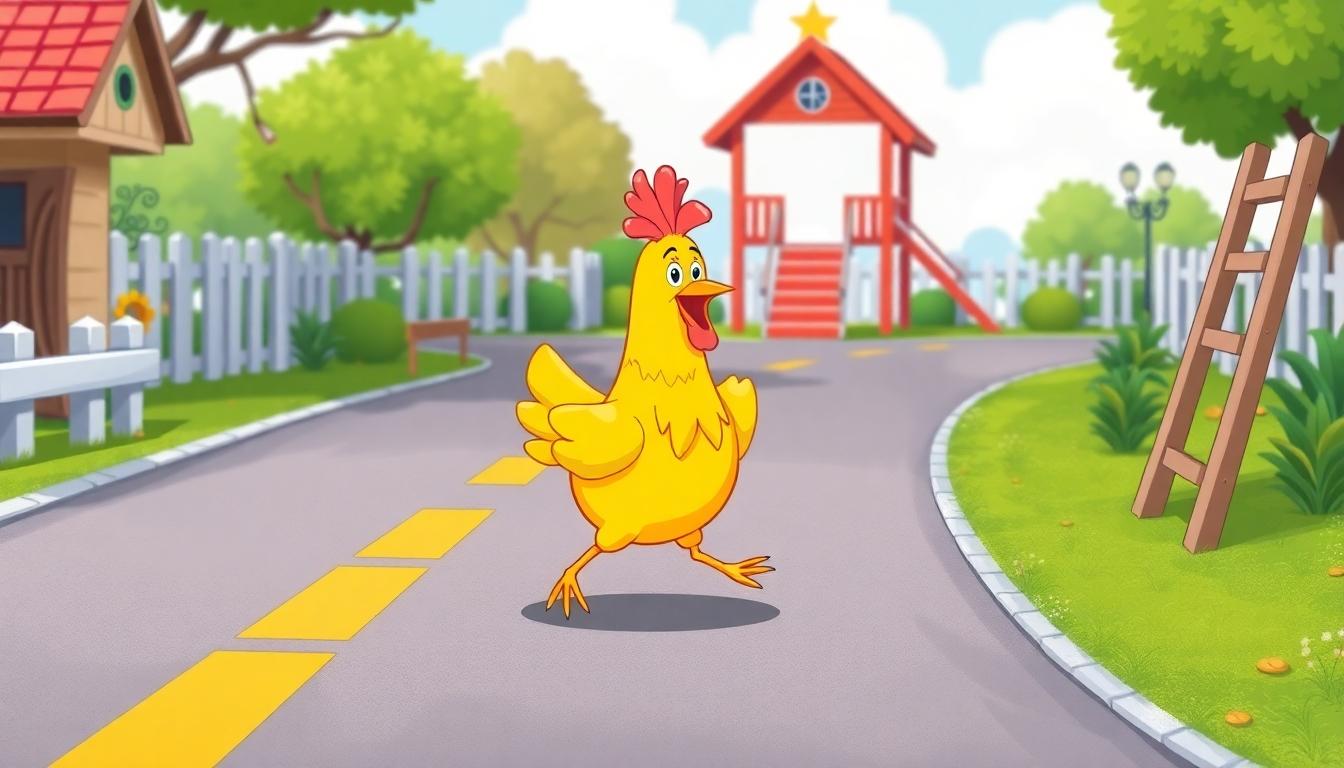
Clean Jokes for Elementary School Children
Looking for some wholesome chicken jokes that’ll crack up the little ones? These kid-friendly classics rely on simple wordplay and universally safe humor perfect for elementary school children:
- Why did the chicken cross the road? To get to the other side! This timeless punchline remains the most recognizable version that children instantly understand.
- Why did the baby chick cross the road? Because it was “take your child to work day”! Kids love this cute family-oriented spin on the classic.
- Why did the chicken cross the road? It thought it was an egg-cellent idea! Simple egg puns always delight young audiences.
- Why did the chicken cross the playground? To get to the other slide! This playground twist creates an unexpected and giggle-worthy punchline.
- What did the chicken say when it got to the other side? “That was egg-citing!” Children appreciate these easy-to-understand punchlines with fun wordplay.
- Why did the chicken cross the road with a friend? It didn’t want to be a lone egg-splorer! This joke reinforces friendship values while maintaining kid-appropriate humor.
Silly and Punny Variations for Young Jokesters
Encourage your young comedians to expand their humor repertoire with these silly chicken joke variations:
- Why did the chicken cross the road? To show the armadillo it was possible! Kids find this unexpected animal companion amusing.
- Why did the rubber chicken cross the road? To stretch her legs! This play on the toy rubber chicken creates visual humor children can easily grasp.
- Why did the chicken bring a ladder? To reach new heights! Simple object incorporation makes this joke visually entertaining for kids.
- Why did the chicken cross during a parade? For egg-citing festivities! This seasonal variation works great for holiday gatherings or school celebrations.
- Why did the chicken sit on the road? To lay it all out! Young jokesters appreciate this silly play on the chicken’s egg-laying abilities.
These jokes provide children with safe, entertaining options for developing their sense of humor through animal antics, simple logic, and light-hearted scenarios suitable for school, family gatherings, or anytime a good laugh is needed.
5 Dark Humor Chicken Cross the Road Jokes for Adults Only

While chicken jokes are often associated with innocent humor, there’s a darker side to these feathered punchlines that’s strictly for adult audiences. Research shows that the classic chicken crossing joke actually has macabre undertones that many miss. We’ve gathered five wickedly funny dark humor chicken jokes that showcase the more mature side of this timeless format.
1. The Original Dark Interpretation
Why did the chicken cross the road?
To get to the other side.
This seemingly innocent joke takes on a completely different meaning when you realize “the other side” can be interpreted as a metaphor for death. Historical research confirms this dark double entendre has been part of the joke since at least the mid-1800s, making it perhaps one of the oldest death jokes hiding in plain sight.
2. The Literal Consequence
Why didn’t the chicken cross the road?
Because it got run over halfway.
This brutally honest take subverts the original joke by acknowledging the realistic danger of a chicken attempting to cross a busy road. The dark humor comes from the unexpected twist that violates our expectation of the chicken successfully completing its journey.
3. The Existential Commentary
Why did the chicken cross the road?
To show the armadillo it was possible.
Darkly existential, this variation implies that the chicken’s actions were a futile demonstration of courage or possibility that likely led to the chicken’s demise. The joke taps into themes of mortality and the pointlessness of heroic gestures.
4. The Historical Wordplay
Why did the Roman chicken cross the road?
She was afraid someone would Caesar!
This joke cleverly combines historical reference with a morbid pun, playing on “seize her” and the assassination of Julius Caesar. The dark humor emerges from the chicken’s fear of being captured or killed, dressed up in sophisticated wordplay.
5. The Survival Irony
Why did the chicken cross the road?
Because there was a KFC on this side.
This dark joke highlights the ironic fate awaiting chickens in our food chain. The chicken isn’t running toward something but away from certain doom, only to likely encounter another danger. The humor comes from the chicken’s impossible situation, regardless of which direction it chooses.
These adult-oriented chicken jokes repurpose the traditional joke framework with darker implications, often using clever wordplay or cultural references. Their humor hinges on subverting expectations and contrasting the original joke’s perceived innocence with more mature themes that explore mortality, futility, and irony.
9 International Versions of the Chicken Joke from Around the World
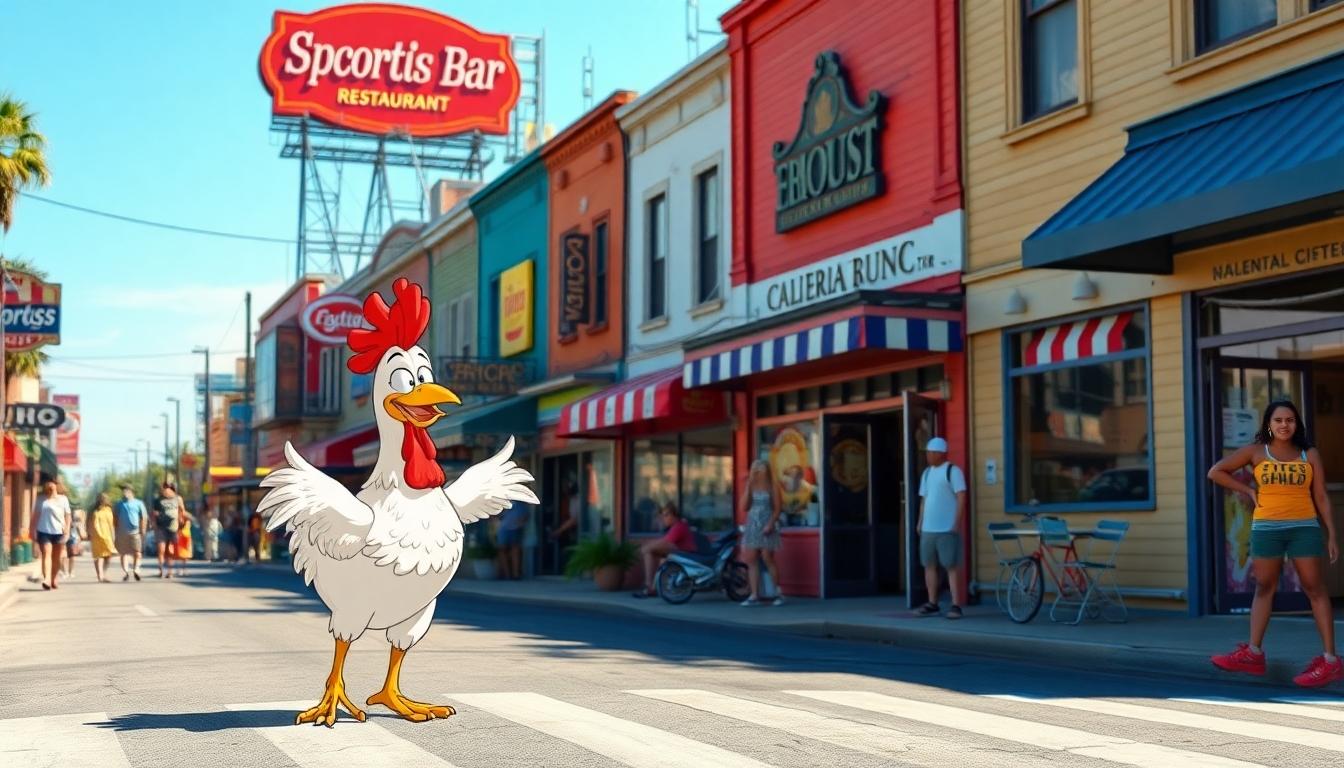
The classic “Why did the chicken cross the road?” joke has traveled far beyond its British origins, adapting to cultural nuances worldwide. Each country puts its unique spin on this timeless riddle, reflecting local customs, language, and humor styles. We’ve gathered nine fascinating international variations that showcase how this simple joke transforms across borders.
1. United Kingdom
The birthplace of this famous joke deserves first mention. British newspapers published the earliest recorded version in 1847, establishing the classic “To get to the other side” punchline. UK versions often incorporate dry wit and subtle wordplay that characterize British humor.
2. United States
American adaptations include both the traditional answer and creative variations like “To get to the loser’s house… Knock knock!” These jokes frequently reference American pop culture, celebrities, and regional stereotypes, making them instantly recognizable to US audiences.
3. France
French versions typically maintain the joke’s structure while incorporating distinctly French elements. The humor often revolves around sophisticated wordplay and cultural references, though exact French variations aren’t as widely documented internationally as their American counterparts.
4. Germany
German adaptations frequently feature practical motivations for the chicken’s journey. Popular versions include the chicken crossing to sample a new beer or to access a different section of the autobahn, reflecting Germany’s famous brewing tradition and highway system.
5. Italy
Italian chicken jokes naturally gravitate toward culinary themes. Common versions involve the chicken crossing the road to reach a pasta restaurant or to escape becoming the main ingredient in a cacciatore dish, celebrating Italy’s renowned food culture.
6. India
Indian variations often incorporate references to bustling markets, colorful festivals, or regional cuisines. The chicken might cross to reach a different part of the market or to participate in a celebration, reflecting India’s vibrant cultural industry.
7. Japan
Japanese versions frequently include technological or cultural references unique to Japan. These adaptations might involve wordplay related to anime, video games, or modern technology, demonstrating Japan’s blend of traditional values and cutting-edge innovation.
8. Brazil
Brazilian chicken jokes commonly feature references to soccer (futebol) or Carnival themes. The chicken might cross the road to join a samba parade or to watch a soccer match, highlighting Brazil’s passionate sports culture and festive traditions.
9. Australia
Australian versions typically incorporate references to the outback, beaches, or native wildlife. Down Under, the chicken might cross the road to avoid a crocodile or to find shade from the scorching sun, reflecting Australia’s unique environmental challenges and outdoor lifestyle.
These international variations demonstrate how even the simplest joke can transform across cultural boundaries while maintaining its recognizable structure. The enduring global popularity of the chicken joke speaks to both its adaptability and universal appeal, making it a fascinating lens through which to view cultural differences in humor.
How to Create Your Own Chicken Cross the Road Joke
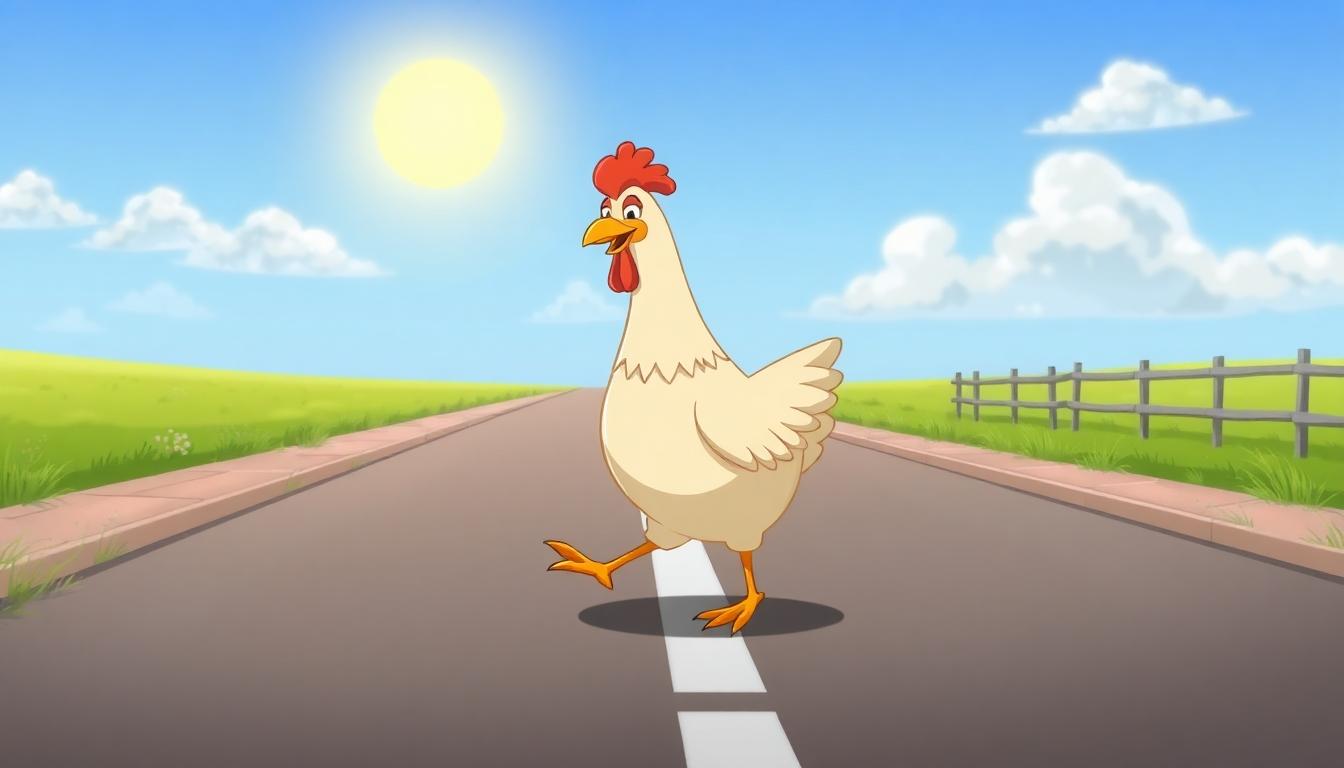
Creating your own chicken cross the road joke is easier than you might think. We’ve broken down the process into three simple steps that anyone can follow to create a memorable joke that will have friends and family chuckling.
1. Start with the Setup
Begin with the classic question: “Why did the chicken cross the road?” This familiar opening immediately signals to your audience that a joke is coming and sets up their expectations. The beauty of this format lies in its universality—everyone recognizes this setup, making it perfect for delivering an unexpected punchline.
2. Add a Twist
Replace the expected answer with something humorous, surprising, or relatable. Your twist can take several approaches:
- Use wordplay or puns by incorporating chicken-related terms like “egg-spert” or phrases with double meanings
- Reference current events or popular culture to make your joke timely and relevant
- Include other animals for comparison, such as “to show the armadillo it was possible”
- Incorporate personal or professional experiences that your audience will understand
The key is subverting expectations while maintaining a clear connection to the original premise.
3. Deliver the Punchline
Timing and delivery matter! Ensure your punchline is unexpected yet makes sense within a humorous context. A good punchline should provide a satisfying conclusion that rewards the listener for their attention.
Example Themes for Inspiration
Wordplay Jokes
These jokes rely on puns and double meanings, such as “Why did the chicken cross the road? To lay it all on the line.”
Reference Jokes
Incorporate cultural phenomena or current events into your punchline. These jokes stay fresh and relevant by connecting to the industry around us.
Absurdity Jokes
These use illogical or exaggerated reasoning for comedic effect. For instance, “Why did the chicken cross the road? Because it heard the grass was greener on the other side.”
Free Range Jokes
Play with chicken-related concepts like “Why did the chicken cross the road? Because it was free range and couldn’t be contained!”
The most successful chicken cross the road jokes often combine elements from different themes while maintaining brevity and clarity. Remember that simplicity usually works best—sometimes the funniest jokes are the ones that don’t try too hard.
Why Chicken Jokes Continue to Capture Our Imagination
Chicken crossing jokes have stood the test of time for good reason. They’re versatile enough to entertain children with innocent wordplay yet sophisticated enough to carry philosophical undertones for adults. From their humble 19th-century origins to today’s celebrity and profession-exact variations these jokes continue to evolve while maintaining their core charm.
Whether you’re sharing kid-friendly versions at family gatherings crafting dark humor for adult audiences or exploring international variations there’s a chicken joke for every occasion. We hope our collection has made you smile and perhaps inspired you to create your own spin on this classic riddle.
The next time someone asks why the chicken crossed the road you’ll have plenty of answers beyond the obvious one. Happy joking!
Frequently Asked Questions
When did the “Why did the chicken cross the road?” joke first appear?
The joke first appeared in print in The Knickerbocker, a New York magazine, in March 1847. While the exact creator remains unknown, this publication marks the earliest documented version of the riddle that would go on to become one of the most recognizable jokes in American culture.
Why has the chicken crossing joke remained popular for so long?
The joke has endured because of its simple anti-humor format that subverts expectations. Its anonymous creation allows it to belong universally to everyone, while its adaptability lets it evolve with contemporary references. The basic format provides an endless template for variations that can reflect changing times, cultures, and sensibilities.
What makes a good chicken crossing joke?
A good chicken crossing joke maintains the classic setup but adds a creative twist that reflects a particular perspective, whether it’s a profession, celebrity, or cultural reference. The best variations are simple, unexpected, and clearly communicate their punchline. Effective jokes often incorporate wordplay, cultural references, or absurdist elements while keeping the format recognizable.
Are there kid-friendly versions of the chicken joke?
Yes, many kid-friendly versions exist that use simple wordplay and wholesome humor. Examples include “Why did the baby chick cross the road? Because it was ‘take your child to work day!'” and “Why did the chicken cross the playground? To get to the other slide!” These jokes avoid mature themes while maintaining the fun format children enjoy.
How has the chicken joke been adapted internationally?
The joke has been adapted across cultures worldwide, with each country adding its own cultural nuances. From British humor incorporating tea references to Japanese versions featuring local customs, these international adaptations maintain the recognizable structure while reflecting local humor styles, language peculiarities, and cultural touchpoints that resonate with regional audiences.
Can the chicken joke have dark humor elements?
Yes, adult-oriented versions often include dark humor elements. Some interpret “the other side” as a metaphor for death, while others highlight the chicken’s place in the food chain. These variations subvert the joke’s perceived innocence with themes of mortality and irony, creating unexpected contrasts that appeal to mature audiences familiar with the original’s wholesome reputation.
How can I create my own chicken crossing joke?
To create your own joke, start with the classic setup (“Why did the chicken cross the road?”), add a twist that reflects a theme, person, or profession, and deliver a clear punchline. Focus on wordplay, cultural references, or absurdist elements. Keep it simple and ensure your punchline connects logically to the setup for maximum humor impact.
Have celebrities created their own versions of the chicken joke?
Many celebrities have inspired variations that reflect their public personas. Einstein-inspired versions reference relativity, while musician variations incorporate rhythmic elements. Political figures like Obama and Clinton have versions featuring their catchphrases. These adaptations showcase how the joke format can be personalized while maintaining its recognizable structure.

